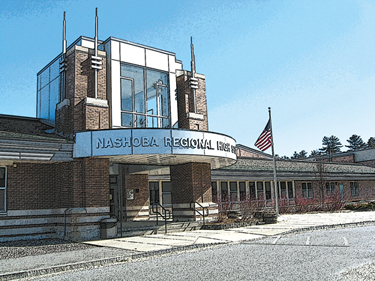
By Ann Needle
The principals of each district school last Wednesday presented the Nashoba School Committee with analysis of the latest MCAS scores — and agreed that high-needs students across the district are lagging. In other topics, the committee postponed discussion on several portions of its agenda, including consideration of a new honor roll system.
Center School Principal Kevin LaCoste reported there were many good signs coming out of the spring MCAS results, including Center’s designation as a level 2 school for the second year in a row. The state ranks schools on five levels, with level 1 being the best. He noted that about 60% of Massachusetts schools are at level 2. Center also met many of its PPI (cumulative Progress and Performance Index) targets, which measures the performance of different groups of students against score targets set by the state. And, 51% of third graders scored “advanced” in Math, a 10% increase over recent years, he said. (Students are ranked advanced, proficient, needs improvement, or warning/failure in each subject.)
As with other district schools, LaCoste reported that Center’s “high needs” students — which includes groups such as those with learning disabilities and English language learners — did not score as well. Overall, however, though English Language Arts scores remain strong, LaCoste noted, “The scores in Stow have, quite frankly, plateaued.” He explained that a potential tool for bolstering these scores could be the readers’ workshops Center is implementing this year, similar to the well-received workshops at Lancaster’s Mary Rowlandson Elementary School.
Rep. Lorraine Romasco of Bolton remarked that, across the district, overall fourth grade scores are “in a bad way.” Joel Bates, principal of Bolton’s Florence Sawyer School, theorized that one reason could be that the grade 4 MCAS is “a different sort of test.” This is the first MCAS test where students need to write a long composition, which can be daunting, he said.
At Hale Middle School, according to Principal George King, “Our results were very, very good.” Among the highlights were a strong showing in ELA — with open response question scores improving — and only four students in eighth grade not earning an advanced or proficient score in a subject. The high-needs group didn’t have acceptable growth in Math scores, with King remarking, “Quite frankly, it’s mystifying.” He pledged to look into what should be done, with an eye toward studying strategies for getting through to struggling students.
Nashoba Regional High School Principal Dr. Parry Graham reported that the school was only one point away from a level 1 designation, so this is, naturally, a goal for the 2015 MCAS. Also, only seven students did not receive advanced or proficient in ELA, “So you can’t get much better than that in terms of raising a ceiling.” Thankfully, every student eventually met MCAS requirements for graduation, he said.
High-needs students made a leap last year in terms of the PPI, scoring 93 on a scale that sets 75 as a passing level, Graham reported. But, he added that this group also has scored at or below the level of peers state-wide in recent years.
Graham stressed that NRHS plan on putting more formal co-teaching in place between special and regular education teachers. And, he noted that tools such as the new Math Foundations class — offered to students struggling in Math — could play a big role in continuing the uptick in high needs students’ scores. Taken in addition to a student’s regular Math class, Graham said Math Foundations has received very positive feedback in its first semester, with teachers reporting that its students’ overall grades have risen.
Honor Roll Hits Technicality
The current route for calculating which students make the honor roll across the district will be around a bit longer. Co-Chair Nancy Federspiel of Bolton explained that the school committee will not discuss and/or adopt the revised honor roll until its next meeting, given that “there were technical questions we just couldn’t answer.”
Nashoba has been working on updating the honor roll requirements — which apply to grades 6 through 12 — aiming to use it to more clearly recognize outstanding work, and to encourage students to challenge themselves with tougher courses. With the vote postponed, any new system would not go into effect until at least the second trimester in the middle schools, and the second quarter at NRHS.
With research showing that teenagers who start school later in the morning have overall better grades than those starting earlier, Superintendent Michael Wood mentioned he was recently approached by a few surrounding districts to “start a conversation” around synchronizing area high schools to later start times. He explained that the Northborough and Southborough districts have a community group that’s been researching the success of later starts.
In more immediate scheduling issues, the committee postponed the planned readings of several policies, and drafts of district and superintendent’s goals, given it would not have a quorum after Federspiel left for a work appointment around 8:15pm. (Absent were Nicole Odekirk of Stow, and Lancaster’s Julie Fay and Kara Keith.) The next committee meeting was slated for November 5, but because too many members can’t attend, the committee unanimously voted to postpone its next meeting until November19.